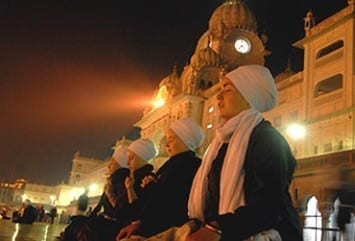![One of the most beautiful places in all the world has to be The Golden Temple in Amritsar, India. It's the most important temple of the Sikh religion, and an incredible place of peace and beauty. Sikh pilgrims come from all over the world to meditate here and are welcomed by open arms and incredible kindness. The site has a free dormitory (even for western visitors) and the cafeteria serves 20,000 free meals a day. Originally a lake known for it's beauty, that many, even the Buddha, came to meditate at. The temple in the middle of the lake was completed in 1604. It has unfortunately been the site of many battles involving the Sikhs, but remains a place of peace. As you walk around the lake, barefooted and listening to the peaceful music and nonstop reading of the Sikh holy verses, you're greeted warmly by pilgrims and local Sikhs, all happy to see foreigners enjoying their place of peace.]()
The riddle of Naam has always been one of the dominating thoughts in my mind.
We all come across the word Naam whenever we do our paath or listen to kirtan. We also hear people talking about ‘Naam laina’ (receiving Naam from a Guru), and ‘Naam japna’ (meditating on Naam).
I have even heard that one has to travel and seek Naam from someone. It was a mystery to me. How do we achieve this Naam that people are talking about? Is it simply the meditation and prayers that people do? It seemed to be some secret formula that only the chosen ones are privy to.
I never understood what it was exactly that all these people were referring to till recently when an issue of “A Word A Thought (AWAT)” captured the attention of my curious mind. I read in the theme of the week, “What happens when we are blessed with Naam– the awareness and recognition of the presence and qualities of the Divine?”
Furthermore, the information that the verses selected for the week are all “from a single hymn in the Guru Granth Sahib and will enlighten us about the effects and implications of imbibing and living with Naam“ – stimulated my mind to look into the hymn and explore it to find out more.
After reading and contemplating the meaning of the hymn a couple of times, it was like, “The egg of my delusion has burst and my mind has been enlightened (SGGS, 1002).”
I found answers to the recurring questions, which had been stuck in my mind for quite long. What is Naam; how do we receive it and from where? What happens when we receive it or are blessed with it?
To my surprise, the whole hymn (SGGS, 671) was mainly about Naam or its identical terms/phrases, and the effects or implications of Naam.
As I studied and looked into it deeply, I also tried to collate similar verses from the hymn, when suddenly the picture became clearer to me. I was so excited and happy; I had cracked a mystery that had baffled me for so many years of my life.
“What is Naam?” I found that the following phrases in the hymn progressively and beautifully expand on the idea and meaning of Naam (through His grace, the Divine has blessed me with Naam):
“I have been attached to the Guru’s feet…
“I have joined saadh sangat (the company of the virtuous and wise)…
“I have been enlightened by the Guru …
“The Word of the Guru seems sweet to me.”
It was obvious that the path to ‘being blessed with Naam’ is here, right now: be attached to the Guru’s feet i.e. be associated with the Guru’s congregation or saadh sangat (the company of virtuous, wise and dedicated humble people). Is that enough? No.
We need to associate with good people (saadh sangat, and to me, my recent sangat is the company of books and readings on Gurbani and discovering the meaning and implication of words, such as, ishnaan, sarovar, sangat, etc.) to enrich ourselves by their knowledge and experience.
We need to learn from Gurbani and continue learning until the words of Gurbani seem sweet to us.
This triggered memories of my past experiences, the occasions when I used to listen to some verses of Gurbani (for instance: O Fareed! Do not slander the dust; nothing is as great as dust. When we are alive, it is under our feet, and when we are dead, it is above us SGGS, 1378) and I was moved to tears as some chords struck deep within my heart.
We need to grasp the understanding of these gems of life to strengthen and restrain our wandering mind. We have to persevere in our efforts to understand the Guru’s words of wisdom.
Now, let’s explore the second part of the hymn, the blessings and effects of Naam. How do we know if we have been blessed with Naam or if the soothing words of Gurbani have had their sweetening impact on us?
Here are the yardsticks that anyone can test with. This is what happens when we believe we have received the gift of Naam. The list is very informative and fascinating. It needs our attention.
So what happens when one is blessed with Naam?
The hymn goes…”I am enabled to free myself from the shackles of Maya and I have forgotten all my worldly entanglements.”
Regarding the shackles of Maya and the worldly entanglements, the AWAT writes, “The shackles (traps) of Maya are the world and its snares… The shackles that enslave human beings… the greedy pursuit of riches; evil-thoughts; superstitions and illusions; vices, and the fear of death, etc.…Worldly attachments and entanglements trap us further in their clutches.”
However, “By seeking the sanctuary of Naam or the wisdom of Gurbani, we are freed of all our worldly entanglements; no longer are we weighted down by them.”
The second verse in the refrain of the hymn states, “I have renounced anxiety, egotism, attachment and evil desires of my mind.”
Elaborating the verse they write, “Ignorant humans forget that their vicious desires are the chains which yoke them throughout life. These desires cause them to worry all the time… However, by associating with wise people and reflecting on the Name of the Divine, we are freed of all our worries and anxieties because our egotism, and attachments and wasteful cravings of our mind do not control us anymore.”
The verses in the stanza 2 and 3 say, “No one is my enemy, nor am I anyone’s foe now. The Divine has manifested within me in all its glow and serenity. I have made everyone my friend and I have become a friend to all. The separation of my mind has been overcome and I am united with the Divine.”
After the literal translation of the quotation, the message follows,”By cultivating the ethical culture of Naam, we are enlightened by the divine principles of Truth. Since we see the Creator in every heart, there is no other. We overcome all our enmity, vengeance and hatred for people or circumstances around us. Thus we develop a friendly attitude towards all, considering everyone as our friends…
“We realise that there is only one universal brotherhood and sisterhood of humanity and other life forms in general to which we owe our care and love.”
Stanza 4 adds, “All my stubbornness has gone and nectar rains down within me. I have realised the Divine is pervading everywhere.”
Illustrating these verses, the authors of AWAT write, “The teachings of the Guru, which appeared to be insipid earlier, have now become sweet and stimulating to the soul’s taste. This love and devotion towards divinity and wisdom enables us to overcome our stubbornness and obstinacy…The mind relaxes as it seems something nectarous and soothing is raining within our hearts. Calmness and peace begins to dwell within us and the rays of such warm pleasantness touches other hearts too.”
Then the AWAT Team very beautifully sums it up, “the ultimate objective of life is attaining higher consciousness or divine-consciousness. It is to be enlightened about the Oneness that pervades all… the rich and the poor, the high and the low. Only such a divine vison that enables us to see this Unity and Oneness can overcome the divisions that the frail human minds have created due to delusion and ignorance…To see the Divine in all is the true purpose of meditation or reflection on Naam, the Divine Name. That is the true goal of a spiritually oriented life for anyone of any religion or race.”
Wow! So simple yet stirring. We need to look into Gurbani, the words of infinite wisdom within our reach, – ponder on them and comprehend their messages. By attuning our minds to these words of divine knowledge, we link up with Naam i.e. the presence and qualities of the Divine, and thus cherish its bounties and blessings.
The summary of the week very aptly describes it all in the end: “Then we can experience the bliss that these Great Minds experienced. The tastes of the world will become sour and the Words of Wisdom will become sweet nectar. If one sees all as one, then there are no more problems for the mind.
“The ills of the world can also be cured if we have this attitude of having no enmity amongst us. If there is no enmity, there is no suffering. Period. Only the blissful shower of divine blessings pervades in the mind.”
I have been associated with the “A Word A Thought” (AWAT) team since its launch. It is a wonderful initiative, perhaps the first of its kind. By taking a word from Gurbani, explaining its meaning through its context in Gurbani, aided by etymological hints, the message of Gurbani is presented in modern and useful terms; this becomes the thought for the day, a useful means to keep the Divine in the mind. At many stages, I have felt so thankful for AWAT. I find it very enlightening and revealing, giving me direction and guidance. The spiritual wisdom contained in the pages of the Guru Granth Sahib finally seems more accessible to me. Many of my misunderstandings and misconceptions have been clarified after reading its daily bite-sized offerings.
Amongst the many enlightening experiences I’ve had through the AWAT, I have shared one of the recent examples with you. My apologies for any mistakes. I am not a scholar, merely a learner in process.
Those who wish to receive these gems of Gurbani from “A Word A Thought”, can subscribe here: http://awordathought.com/




























